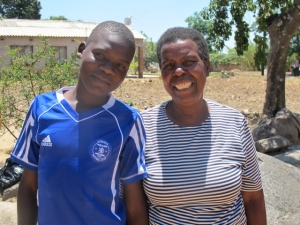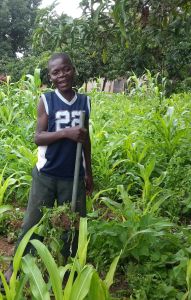 My name is Gibson Chijaka, and for the last two years I have endured dozens of nauseating tablets every day. Today, I am so happy and cannot hold back my joy; I am cured of multidrug-resistant tuberculosis (MDR-TB).
My name is Gibson Chijaka, and for the last two years I have endured dozens of nauseating tablets every day. Today, I am so happy and cannot hold back my joy; I am cured of multidrug-resistant tuberculosis (MDR-TB).
Me with my grandmother, Margaret Kadzere, October 2014. © Stambuli Kim/MSF
The last two years have been the most painful in my life. First being diagnosed with MDR-TB, a highly stigmatised disease, at the tender age of 14 was not easy for me. People would ask what type of TB he has, which needs injections every day for eight months. Some would even ask what type of TB is it that he has to take about 18 tablets every day for two years. This is in addition to the anti-retroviral drugs I was already taking.
The treatment for MDR-TB alone scares many. It is a neglected disease, which has been forgotten about by many people. There is no easy cure and very little has been invested in finding one; instead, patients are left to endure drugs that have awful side effects—causing nausea, weakness, and even deafness in some cases. MSF are working to change this.
I would have naturally preferred that my mother looked after me during that period but, unfortunately, I have never known my mother, as she passed away when I was still an infant. I don’t even know her face. Luckily, my brother’s mother in law has been there for me all the time. I don’t know how I will repay her, but she has been super—the best in the world.
Owing to a lack of information, MDR-TB is still stigmatised in my community. However, the medication makes it even worse—it’s daunting. So being diagnosed with MDR-TB is a double tragedy. You have to deal with the stigma as well as the agonising medication.
My only wish and plea to those overseas where these drugs come from is for the treatment to be made simpler, shorter, and less painful. Having an injection every day for eight months is not easy. In total, I received close to 200 jabs over eight months and my body became numb; I no longer felt the pain of the needle. In the initial days, I really wished that I could quickly complete this painful phase and just take the pills.
But the pills were not better either, as I would take nine in the morning and the same number in the evening. I felt like vomiting after taking them and at one point I wanted to quit. I doubted that I could hold on for two years having this nauseating feeling every day. I had surrendered my fate to the Almighty as this was beyond anyone’s control.
The community health worker, the nurses, and my family all played a crucial part in my treatment. The community health worker has been visiting me every day with my medication. She is doing it voluntarily, and I feel this left her with little time to also attend to her own business. I want to thank her for this generosity.
But thinking of it, I don’t know why we cannot have just one tablet a day and for a shorter period for this type of TB. While I am grateful that the drugs have kept me alive, it was like going through hell for me so that I could enjoy this life. I don’t think it has to be so painful for one to be cured of MDR-TB. If only I had an opportunity to talk to those who make these drugs, my appeal would be please can’t you just combine all these 18 tablets I was taking every day into one. And why not make it powerful, so that I don’t have to endure two years of taking them every day—the shorter the period the better.
You see if this treatment was shorter, I would have only dropped out of school maybe for just three months and rejoined my group. But now I have lost two years, as I could not attend school. The schedule for my medication was clashing with the school timetable so I had to make a very difficult decision.
 Now that I have been cured, I have to start planning my future. I could not do that two years ago as I was not even sure if I would make it. Now that I have made it, I want to work for the better of my community, even without getting any remuneration. I want to encourage those who will fall into a situation like mine never to give up on life. I have been there so I know how it is. This is the only way I can say thank you to those who never gave up on me: the MSF teams, my family, and community.
Now that I have been cured, I have to start planning my future. I could not do that two years ago as I was not even sure if I would make it. Now that I have made it, I want to work for the better of my community, even without getting any remuneration. I want to encourage those who will fall into a situation like mine never to give up on life. I have been there so I know how it is. This is the only way I can say thank you to those who never gave up on me: the MSF teams, my family, and community.
Working in my grandfather’s fields, October 2013. © Patricia Mazuru/MSF
I want to thank my lifesavers, the MSF team. These people kept on encouraging me when I was weary. I also want to thank those who made it possible for me to get the drugs through their donations to MSF. Wherever you are, please be gratified that you have saved a young soul, and I am sure there are thousands of others who have been saved through your support.
Gibson Chijaka is 16 years old and lives in Epworth, a small town outside of Harare, Zimbabwe. He has recently completed the arduous two year treatment for multidrug-resistant tuberculosis and is hoping to return to full time education. Read more from Gibson and other patients going through treatment for MDR-TB on MSF’s TB&ME blog.
Competing interests: None declared.
About MSF and MDR-TB
Medecins Sans Frontieres/Doctors without Borders (MSF) has been treating people with tuberculosis (TB) for over 30 years, and is one of the biggest non-governmental organization providers of multidrug-resistant tuberculosis (MDR-TB) care worldwide.
Each year TB kills 1.4 million people, with nearly another nine million suffering from the disease, mainly in developing countries. Our staff are witnesses to the breadth of the TB crisis as it spans the globe and, in recent years, the growing severity of drug-resistant tuberculosis.
In 2013, MSF treated 29 900 patients for TB and 1950 for MDR-TB.
To find out more about our campaign work to improve the treatment and diagnosis of TB, please visit the MSF Access Campaign website.
Please give generously to Médecins Sans Frontières
· £38 can pay for a suit to protect against Ebola virus
· £53 can send a doctor to the field for a day
· £95 can provide a year’s supply of treatment for a person living with HIV
· £153 can provide lifesaving blood transfusions for three people
You can donate:
· Online at www.msf.org.uk/thebmj
· By phone: 0800 408 3897
· £5 by texting “Doctor” to 70111*
*UK mobile networks only. You will be charged £5, plus your standard network rate. MSF will receive 100% of the £5 donation. If you have any questions please call +44 (0)207 404 6600.